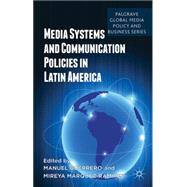Media Systems and Communication Policies in Latin America analyzes the conflicting roles that global, regional, and local forces play in the shaping of media systems, policies, and industries in Latin America. These forces have developed what is called a captured liberal model, which is used as a theoretical concept to explain the communication policies, the configuration of media systems, the realities of journalism or the contexts of cultural industries in the region. The intentional lack of regulation enforcement, the pragmatic exercise of power, and the configuration of alliances between media barons and political elites all help to explain why private media developed early and why its concentration is so high in Latin America. Moreover, the fact that media conglomerates emerged under the auspices of dictatorships and authoritarian rule clashes with the existing assumptions that
private ownership entails distance and autonomy from the state. Their emergence also dispels the assumption that authoritarian states need to employ harsh regulation and secure administration or control of the media to better exert and legitimize power. This collection aims to offer fresh perspectives on old issues that have long preoccupied the academic community in Latin America.
private ownership entails distance and autonomy from the state. Their emergence also dispels the assumption that authoritarian states need to employ harsh regulation and secure administration or control of the media to better exert and legitimize power. This collection aims to offer fresh perspectives on old issues that have long preoccupied the academic community in Latin America.








